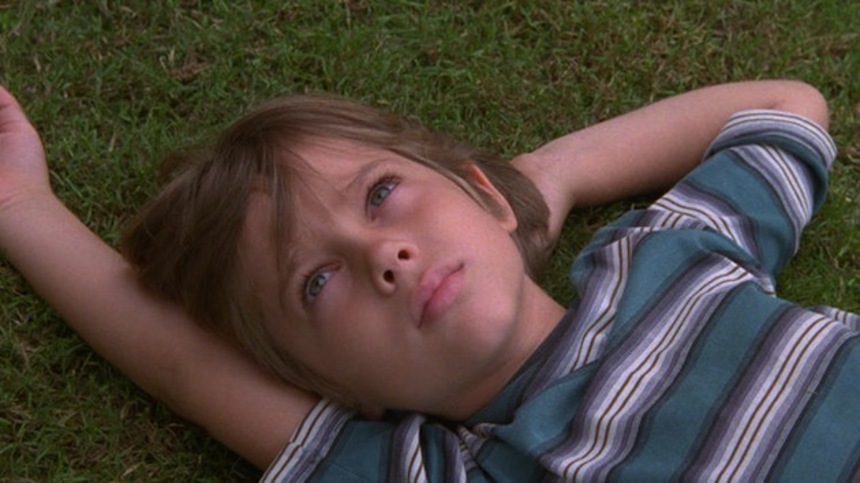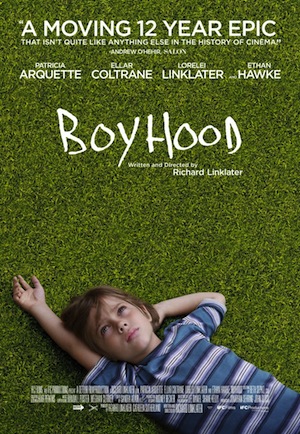Review: BOYHOOD, An Extraordinary Chronicle Of Growing Up

Boyhood begins with a shot that feels lifted from the director's animated dream-scape/ philosophy course Waking Life. We are witness to the sky: a brilliant blue, with fluffy clouds that look like they are out of, well... a dream. In one shot, even before we see our hero, Linklater establishes an exacting theme for the film: the wonder of curiosity. We then meet Mason, a sandy haired boy of about six. His bright eyes hold a wisdom beyond his years. These eyes were the eyes looking up into that blue sky, those clouds, and beyond.
Like many of Linklater's heroes, alter-egos and creative outliers, Mason is a dreamer. His mom, Olivia (played wonderfully by Patrica Arquette), inquires as to why he did not hand in his homework. "Because nobody asked me to," he plainly states. It is 2001, and Mason lives in a Texas suburb with his mother and older sister Samantha (Lorelei Linklater). His days are spent biking with buddies, playing video games and making graffiti. When his mom announces they are moving to Houston so she can continue her schooling, Mason and Sam take it like any children would: they are weary and skeptical and scared, taking it out on their mom and each other.
The move to Houston eventually yields a step-father in the form of one of Olivia's professors... and step siblings. Boyhood, with its own brand of grand intimacy, does not yield much traditional plotting outside of linearly charting Mason ages 6-18, but we encounter many dynamic stories and characters that ebb and flow, appear and disappear throughout the film's 161 minute running time. Many of these come in the form of adult males, sometimes antagonists, perhaps even falling into old cliches (especially when considering the good ol' boy mentality of some Texans).
But in the hands of Linklater, these men are always painfully human. Broken children themselves, they are usually put off by Mason, who just seems to be himself, equally conscious of the world around him and blissfully elsewhere. One step-father's story erupts in abuse and alcoholism, a second step-father's tale ends similarly though less sensationally. Mason's birth father, played by Linklater mainstay Ethan Hawke, is, despite not being around for long stretches of his children's lives, the good man. And that's because it's been a hard journey for Mason Sr. too. What separates him from the rest of the men Mason, Olivia and Sam encounter, is that he's just quite plainly honest about all the bullshit in life.
 What may be the most fascinating and indeed quite beautiful thing about Boyhood
is that it is not a coming of age story. For Linklater is not wholly
interested in how a child could eventually defines himself as an adult person
in the world. Because Mason at 6, at 8, at 12, at 15, is already very much a
person. Childhood through Linklater's lens is then that time to define and reshape as needed...
just as much as it can be in his films about adulthood. Through long and short hair, that preteen pudginess to lanky, sallow faced teen, to earrings,
punky skater clothes and the embarrassing t-shirts a mom picks out for her
son, we see the astonishing mutability of a person, who remains very
much themselves, and yet, totally becomes someone else. Every boy's love
of Star Wars and video games morphs into a passion and dedication for
photography we not only see but palpably feel.
What may be the most fascinating and indeed quite beautiful thing about Boyhood
is that it is not a coming of age story. For Linklater is not wholly
interested in how a child could eventually defines himself as an adult person
in the world. Because Mason at 6, at 8, at 12, at 15, is already very much a
person. Childhood through Linklater's lens is then that time to define and reshape as needed...
just as much as it can be in his films about adulthood. Through long and short hair, that preteen pudginess to lanky, sallow faced teen, to earrings,
punky skater clothes and the embarrassing t-shirts a mom picks out for her
son, we see the astonishing mutability of a person, who remains very
much themselves, and yet, totally becomes someone else. Every boy's love
of Star Wars and video games morphs into a passion and dedication for
photography we not only see but palpably feel. Linklater fans will remember that section in Waking Life where the two middle-aged women talk about how our cells regenerate every seven years, and we are, thus, a new person every seven years. Boyhood could then be the cinematic actualization of that idea. But this is not merely Mason's story. This is his family's story too. Arquette's Olivia goes from a hard working single mother, to wife and full time student, to teacher and single mother once again. Hawke's Mason Sr. starts out as the cool, GTO driving dad whose been off on a boat in Alaska, to a man who settles down with a new wife and child, and is thus able to become more present in his older children's lives. Played by Linklater's own daughter, Lorelai, Mason's older sister Sam is the know-it-all, at times a best friend and worst enemy. The attention spent on the siblings' relationship may not be the focus of the film, but it is key to making it feel believable, and Lorelai Linklater is a joy to watch.
So that brings us to Linklater's main collaborator on this journey: Ellar Coltrane. Boyhood, which could very well be subtitled "Portrait of the American artist as a child," expects a lot of Coltrane, but it is in Linklater's wish to collaborate freely that allows the now young man to participate in such fascinating ways. What we witness here is perhaps like nothing quite seen before in the medium. On one hand there is the actor developing his craft and skill, becoming more elated by ideas and theories, and confident in and fascinated by the world around him. Where Mason ends and where Coltrane begins is a hard line to draw, but that does not lessen his performance. In fact, because of the nature of the film, it no doubt strengthens it.
As it goes, Linklater's cinema is an inquisitive cinema. One of curiosity, resonance, and observation. He cherishes the moments that offer solitude and reflection as much as the camaraderie and conflict one can find with others. It may be appropriate in some circles to call Boyhood his magnum opus. Because to consider Boyhood is to consider Linklater's 25 year career, thus far. From his first underground feature It's Impossible To Learn To Plow By Reading Books, to his ode to high school, Dazed And Confused, and perhaps most importantly and relevant here, his 17-year spanning Before Series.
To consider Boyhood is to also consider early 21st century America: its politics, its culture, its wars and technology. As a document of a generation of children, and a generation of parents, it is perhaps more complete, alive and important than any other American film of its kind in the last 15 years. It's clarity of vision is remarkable for all its extraordinary parts coming together so beautifully.
This is then a work of a seasoned storyteller who is able to look at the world with fresh eyes. Linklater acts as the wanderer, the outlier, and if you want to get really book-smart about it, he is the quintessential cinematic chronicler of the rise of the Left Brain thinker in America. Once called slackers (an affectionate term for Linklater), these young men and women are now the innovators and bright thinkers of our time. Whether they know it or not.
For Linklater to chart such a path from childhood on, with a collaborator like Coltrane at his side, is a miracle in any medium, but all the more wondrous to behold in cinema: a form more often than not focused on the short-term approach.
This review was published in a slightly different form during the 2014 Sundance Film Festival. Boyhood opens in New York and LA on July 11 with a nation wide release to follow.

Do you feel this content is inappropriate or infringes upon your rights? Click here to report it, or see our DMCA policy.






